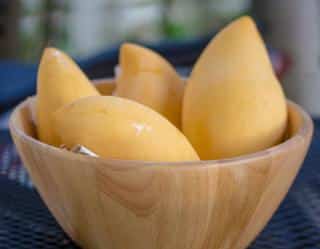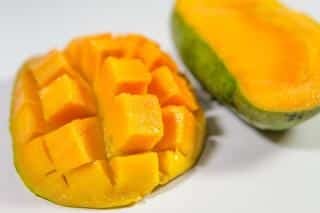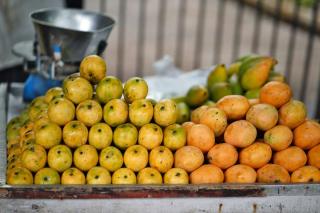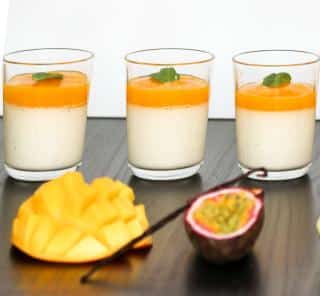

Mango or Mangifera belongs to the Anacardiaceae family. This soft, sweet and very orange tropical fruit is native to Southern Asia, India more specifically. It’s possible to take advantage of mango and its health benefits all year long.
The tree itself can reach heights of 85 feet (40 m).
In the Western world, many different mango varieties are available for sale on market stalls: yellow, green and red and all shades in between. After bananas, mango is often the favorite exotic fruit of many people.
Mango is native to India. It has been grown for over 4,000 years by Buddhist monks. The people of India also appreciate it greatly, since Buddha was said to meditate under its shade. Moreover, the mango tree is a symbol of love and friendship for Indians.
In the XVIth century, mango was brought to Africa, and after that to the Americas.
It took a long time before it spread to Europe, which only happened towards the XVIIIth century.
Mango is laden with pro-vitamin A, beta-carotene with 4,000 micro-grams for 3.5 oz (100 g). Beta-carotene is a pigment that impacts how we see colors. Thus mango prevents photoreceiver degeneration and thus staves off ARMD which usually affects elderly persons. Mango is excellent for vision.

It’s also a source of B group vitamins, pro vitamin A, especially beta-carotene, iron with 1 mg / 3.5 oz (100 g). This helps prevent anemia, particularly for women who have just menstruated or are with an ongoing pregnancy.
There’s also copper with 0.100 mg / 3.5 oz (100 g). Copper stimulates erythrocyte production, which are the red blood cells that lock oxygen down from the air we breathe in. Other essential minerals such as sodium, magnesium and calcium are provided, too.
Mango contains antioxidants that protect the body from free radicals and cell ageing. They also work to prevent cancers and cardiovascular diseases, since they lower bad cholesterol levels.
Also, mango imparts anti-inflammatory properties, it can thus soothe respiratory inflammations (asthma) and inflammations in the joints (arthritis).

Mango cares for your liver. It stimulates the secretion of bile and purges gastric tracts and liver conduits.
This exotic fruit is also diuretic, it prevents dehydration since it’s 83% water.
It also supports digestion and enhances transit, thanks to the fibers it contains: 1.8g.
Against constipation problems, mango is a very effective laxative.
Infusion with mango tree roots: excellent diuretic.
Mango tree bark is astringent. As part of a herbal tea, it can stop bleeding and reinforces clotting.

The seed of the mango fruit contains a core that can be used to eliminate intestinal parasites, it is a potent dewormer. Internal use: Powder the core and the resulting powder will be effective.
Mango leaves also boast the following properties: antiseptic, antipyretic, anti-hemorrage. They’re also effective in case of scorpion sting or insect bite.

When included in a smoothie, ice cream, or in mousse, it is very refreshing.
It also pairs and lends color to your starters, fish dishes, duck and fowl.
Kebab-style, add cubes of mango between shrimps and gambas on the stick.
When sautee’d, mango is delicious cooked together with scallops and honey.
Mango is also a dedicated partner for you as regards cosmetics: it takes care of your skin. It boasts nourishing, hydrating activity and delays cellular ageing. It also protects skin from the sun.
A natural mango mask to hydrate skin – Blend half a mango and add a teaspoon olive oil. Apply on face, let it imbibe your skin for 10 minutes and rinse off.
A body scrub with mango – Blend half a mango, add two table spoons honey and coarse salt. Perfect to eliminate dead skin.
Butter extracted from the mango seed core is a treasure for your dry, brittle and damaged hair. It will nourish and hydrate your hair from root to tip.
Use the inside portion of the mango peel to rub your skin and scrub, hydrate and tighten skin pores thanks to its astringent activity. Mango seed is also a very useful exfoliant.
Keeping fresh mango – Don’t place it in the refrigerator, simply store it in a cool spot.
Well written article on Mango benefits